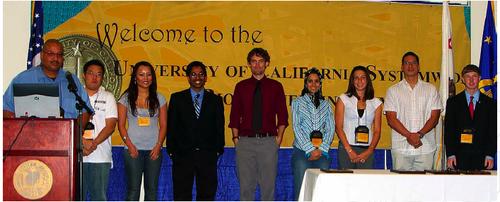News Release
Technology for Early-Cancer Diagnosis Leads Bioengineering Grad Student to Many Prizes and a Startup Company
San Diego, CA, May 11, 2009 -- For breakthroughs aimed at early-stage cancer diagnostics, Raj Krishnan, a bioengineering Ph.D. student at the University of California, San Diego has taken home three first place awards at graduate research competitions this year. Not pausing to polish his awards, Krishnan has co-founded Biological Dynamics, a startup company aimed at transferring the new cancer diagnostic technology from the laboratory to the clinic.
Krishnan works at the intersection of bioengineering, nanoengineering and medicine. His new technology offers a better way to identify and separate secondary cancer biomarkers directly from blood, such as cell-free circulating high molecular weight DNA. In addition to cancer diagnostics, Krishnan’s suite of novel technologies can be used to manipulate cancer cells and stem cells in a simple manner using AC Electric Fields. This improved method for manipulating cells could save researchers large amounts of time and money.
 |
| Raj Krishnan won the Rudee Research Expo Award 2009 Outstanding Poster at the 2009 Jacobs School of Engineering Research Expo. |
From among the 240 posters submitted by graduate students from across the Jacobs School of Engineering at the 2009 Research Expo, Krishnan took home the grand prize: the Rudee Research Expo Award 2009 Outstanding Poster. Also at Research Expo 2009, he won the NanoEngineering Best Poster Award and the Science and Engineering Library Award for Best use of Literature.
Winning three Research Expo awards in one year is extremely rare if not unprecedented.
 |
| Raj Krishnan (4th from left) being given a presentation award alongside other award winners at the 9th annual UC System wide Symposium. |
In addition, Krishnan tied for first place for best presentation at the All-Grad symposium but was ineligible due to a limit of one award per student.
 |
|
Raj Krishnan (left) won the best bioengineering graduate student poster award at the 23rd annual BEGS Symposium. Bioengineering Chair and Professor Shankar Subramanian (right) presented the award. |
Krishnan has won 11 awards over the past three years, with seven awards coming in the last three months. On the heels of these honors, Krishnan has formed a company—Biological Dynamics—to commercialize his research. Heller and fellow bioengineering graduate students David Charlot and Roy Lefkowitz are co-founders.
The founders of Biological Dynamics aim to construct devices for isolating bionanoparticles and cancer biomarkers directly from blood to detect cancer at its very early stages. They are currently looking for investors interested in their technology.
While there are available therapeutics that are adequate at treating and curing some cancers, many patients are diagnosed with cancer too late for these therapies to work properly: often because current cancer diagnostics are unable to identify early stage tumors.
Krishnan’s graduate research at UC San Diego and the startup company he cofounded both are focused on identifying secondary tumor biomarkers such as cell-free circulating DNA in blood. With this approach, it may be possible to detect cancer long before current diagnostic tests can because these “large” pieces of DNA generally appear in the blood well before a tumor can be detected. Focusing on secondary biomarkers, therefore, opens the possibility of identifying virtually all cancers—instead of only a few specific types of cancer.
“I founded Biological Dynamics with the hope of proving tangible health benefits to humans around the world…and at the same time advancing the science of early cancer diagnosis. Cancer screening tools that catch cancer early can greatly increases treatment success rates and reduce the severity of treatment side effects.” said Krishnan.
The technology behind early cancer diagnosis
The core technology behind this potential cancer diagnosis breakthrough is called high conductance dielectrophoresis (HC-DEP). With HC-DEP, when you apply an electric field to a sample sitting on a special chip, different components of the sample separate out on different parts of the chip. Last year, the team—led by bioengineering graduate student Krishnan from Professor Michael J. Heller's NanoEngineering lab—published a key technical breakthrough in the journal Electrophoresis. They showed that unlike conventional DEP, HC-DEP can be used to separate the components that make up blood samples and other high ionic strength samples. Now, the team's new work demonstrates that unlabeled high molecular weight DNA nanoparticles can be separated and detected in whole blood samples using this technique.
The implications of this work may reach well beyond new cancer diagnostic tools. The researchers say a similar approach can be used to separate different kinds of stem cells. The overall goal for the research is to create a new generation of “seamless” sample-to-answer diagnostic systems; where a complex sample is run through the device, and the specific analytes are rapidly concentrated onto microscopic locations and subsequently detected. Such HC-DEP systems will allow complex clinical and biological samples such as blood, plasma and serum to be rapidly and directly analyzed for a variety of important disease-related biomarkers.
Awash in awards
In 2008, Krishnan won first place in the UC San Diego All-Grad Research Symposium, making him a repeat winner. He has also placed in the top three at the BEGS Symposiums for the past three years and has placed in the top three for both the fall and winter business plan competitions at the annual UC San Diego Entrepreneur Challenge http://challenge.ucsd.edu. Also in 2008, Krishnan was awarded the third place Genentech presentation award at the ninth Annual UC System wide Bioengineering Symposium, which features researchers from every University of California campus.
Media Contacts
Daniel Kane
Jacobs School of Engineering
858-534-3262
dbkane@ucsd.edu